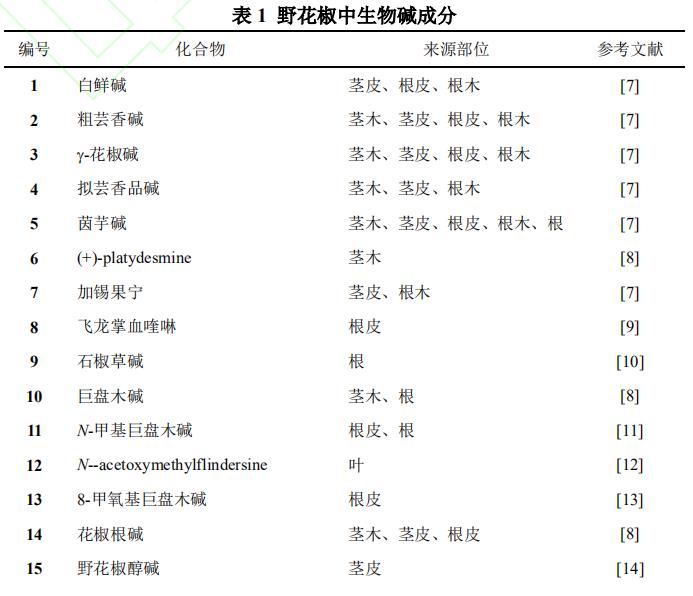不仅果实可作为调味品使用
野花椒ZanthoxylumsimulansHance为芸香科花椒属植物,野花药理研究是椒化进展药食两用的资源,具有重要的学成药用和食用价值。野花椒含有生物碱、分及木脂素、作用香豆素、野花药理研究萜类、椒化进展甾体类等成分,学成具有抗炎、分及抗菌、作用杀虫、野花药理研究抗肿瘤、椒化进展心脑保护、学成抗血小板凝聚等药理作用。分及本文对野花椒中的作用化学成分及其药理作用进行系统的归纳总结,明确其物质基础,以期为野花椒的深入研究及资源的开发利用提供参考。
野花椒ZanthoxylumsimulansHance为芸香科花椒属植物,不仅果实可作为调味品使用,而且果实、叶、根、根皮和树皮均可药用。果实习称野花椒,收载于《全国中草药汇编》,具有温中止痛、杀虫止痒的功效。叶习称野花椒叶,收载于《泉州本草》,具有祛风除湿、活血通经的功效。根习称展蒲展,收载于《中国民族药志》,可用于治疗风湿、歪嘴、避孕。根皮和干皮习称麻口皮子药,收载于2009年版《湖南省中药材标准》,具有祛风除湿、散寒止痛、解毒消肿的功效。虽然大都是民间民族药或地方中药品种,但其临床疗效确切,如麻口皮子药就是湖南省有名的祛风湿中药。同时,野花椒分布面广,在青海、甘肃、山东、河南、安徽、等地均有分布,资源丰富。目前,关于野花椒的化学成分和药理作用研究已有很多报道,尤其是其在抗类风湿关节炎等方面展现出了很好的开发利用前景,因此,为了给野花椒的深入研究和开发创新药物提供参考,为了更好地开发利用野花椒这一药食两用资源,本文综述了近年来野花椒的化学成分和药理作用研究进展。
1化学成分
野花椒中已报道的成分有生物碱、木脂素、香豆素、萜类、挥发油等,其中生物碱和木脂素是野花椒的主要活性成分。
1.1生物碱类
生物碱是野花椒的主要化学成分,已报道生物碱59个。其结构类型主要包括喹啉类生物碱(1~9)、喹啉酮类生物碱(10~33)、苯骈菲啶类生物碱(34~51)和异喹啉类生物碱(52~57),其他类生物碱如吡咯类生物碱(58)和有机胺类生物碱(59)。见表1、图1。








声明:本文所用图片、文字来源《中草药》,版权归原作者所有。如涉及作品内容、版权等问题,请与本网联系删除。
相关链接:野花椒,血小板,木脂素




